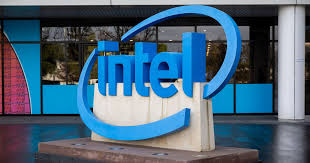Business
商业版块
Intel
英特尔
Hard reboot
硬重启
Can Pat Gelsinger turn the chipmaking giant around?
帕特·盖尔辛格能扭转芯片制造业巨头英特尔的颓势吗?
“Success breeds complacency. Complacency breeds failure. Only the paranoid survive.” So said Andy Grove, the Hungarian emigre who helped turn Intel from a scrappy startup in the 1960s into the firm that did more than any other to put the “silicon” in Silicon Valley. They will be ringing in the ears of Pat Gelsinger, Intel’s new boss, who took over on February 15th. He takes the helm of a company that looks, from some angles, to be in rude health. With $78bn in revenue in 2020, it is the world’s biggest chipmaker by sales. It has a 93% share of the market for powerful—and lucrative—chips that go into data-centre computers, an 81% share in desktop pcs, and operating margins of around 30%.
“成功滋生自满,自满导致失败,只有多虑之人才能生存下去。”匈牙利移民安迪·格鲁夫如是说。安迪·格鲁夫帮助上世纪60年代时破败的初创公司英特尔摇身一变成为无出其右的硅谷本“硅”。他的这番话将继续在2月15日上任的英特尔新老板帕特·盖尔辛格的耳边回响。从某些角度来看,帕特·盖尔辛格执掌之下的英特尔状态稳健。英特尔2020年营收为780亿美元,是全球销量最大的芯片制造商。关于功能强大且利润丰厚的芯片市场,因特尔在计算机数据中心市场占有93%的份额,在台式电脑市场占有81%的份额,运营利润率在30%左右。

Yet Intel’s share price has underperformed those of rivals. Nvidia, a firm with one-seventh of Intel’s revenues, has a market capitalisation, at $370bn, that is half as high again. The manufacturing technology on which much of Intel’s success was built has fallen behind. It has missed the smartphone revolution. Some of its big customers, such as Apple and Amazon, are turning into competitors. Mr Gelsinger inherits quite the in-tray, then.
然而,英特尔的股价却逊于竞争对手。营收只有英特尔的七分之一的英伟达公司市值高达3700亿美元,是英特尔的一半。英特尔能够成功所依靠的大部分的芯片制造技术已经落后。它错过了智能手机革命。它的一些大客户,如苹果和亚马逊,正在变成其竞争对手。基尔辛格相当于接过了烫手的山芋。
Start with production. Chipmaking is propelled by the quest for smallness. Shrinking the components in integrated circuits, these days to tens of nanometres (billionths of a metre), improves the performance of both the components and the microchip as a whole. For decades Intel led the way, its “Tick-tock” strategy promising a manufacturing revolution every other year. Now “it has lost its mojo,” says Alan Priestley of Gartner, a research firm, who worked at Intel for many years. Its “ten nanometre” chips were originally pencilled in for 2015 or 2016 but did not start trickling out until 2019—an unprecedented delay. The technology is still not mature. In July Intel said the next generation of “seven nanometre” chips would not arrive until 2022, a delay of at least six months.
先从生产开始。芯片制造受到对尺寸小型化追求的推动。如今,将集成电路中的组件尺寸缩小到几十纳米(十亿分之一米)级,提高了组件和整个芯片的性能。几十年来,英特尔一直处于领先地位,其“Tick-tock”战略承诺每隔一年就要进行一次制造业革命。咨询公司高德纳的艾伦·普里斯特利曾在英特尔工作多年,他说,“英特尔已经失去了昔日的辉煌”。它的“10纳米”芯片原本计划在2015年或2016年推出,但直到2019年才开始陆续问世,这是前所未有的延迟。这项技术也还不成熟。7月,英特尔表示,下一代“7纳米”芯片要到2022年才能问世,又是至少6个月的延迟。
译文由可可原创,仅供学习交流使用,未经许可请勿转载。












